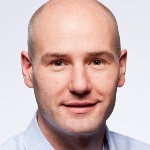Any "function" in living and synthetic materials requires to autonomously create inhomogeneous and adaptable structures, typically on very different length scales from molecular to macroscopic. Our research evolves around the question how such complex "behavior" (both structural and dynamical) emerges when many molecules (more generally, constituents) come together, and what are the physical principles. We tackle specific problems from the perspective of classical many-body statistical physics, in particular the theory of phase transitions, but extended to systems constantly driven away from thermal equilibrium. To this end, we also develop methods, both theoretical and numerical.
Current projects include:
- Dimensionality reduction and Markov state modeling (TRR 146)
- Supramolecular assemblies (GRK 2516)
- Structure formation of organic molecules on substrates
- Collective complex behavior in active matter
- Renormalization techniques
- Arrested dynamics (supercooled liquids and gels) and dynamical facilitation
Contact

Thomas Speck
Prof. Dr.Head of Institute

